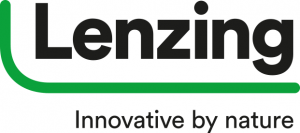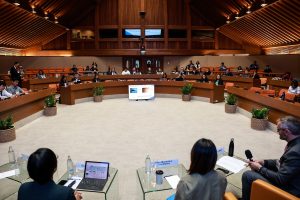 LENZING, Austria— September 20, 2024 — VEOCEL™, the flagship specialty nonwovens brand of Lenzing Group, highlighted its commitment to innovation and providing solutions to help address the global plastic crisis at the “SEA of Solutions 2024” (SoS) event organized by SEA circular — an initiative by the UN Environment Programme (UNEP) and the Coordinating Body on the Seas of East Asia (COBSEA) on September 18 in Bangkok, Thailand.
LENZING, Austria— September 20, 2024 — VEOCEL™, the flagship specialty nonwovens brand of Lenzing Group, highlighted its commitment to innovation and providing solutions to help address the global plastic crisis at the “SEA of Solutions 2024” (SoS) event organized by SEA circular — an initiative by the UN Environment Programme (UNEP) and the Coordinating Body on the Seas of East Asia (COBSEA) on September 18 in Bangkok, Thailand.

Since its launch in 2019, SoS has served as a platform for sharing best practices, fostering collaboration, and exploring solutions to address plastic pollution. Lenzing’s participation builds on longstanding efforts to provide cellulosic fibers for the nonwovens industry that are high quality, manufactured with high production standards with low emissions to air and water1, and minimize the reliance on synthetic materials. Guided by the company’s “Naturally Positive” strategy2 the VEOCEL brand has been pioneering the acceleration of systemic transformation by driving conversations around preventing plastic pollution and advancing effective end-of-life product solutions3.
On the theme of “Re-designing for a Circular Plastics Economy,” Norma Schönherr, Manager of Partnerships for Sustainability at Lenzing AG, Nonwovens, shared VEOCEL’s best practice examples to “Tackling Microplastics Pollution by Advancing to Cellulosic Fibers.” Schönherr emphasized how Lenzing’s VEOCEL fibers that are wood-based4, biodegradable and compostable5 can serve as a more responsible alternative to synthetic, plastic-based materials, particularly in applications such as personal hygiene and sanitary products.
VEOCEL fibers contribute to the circular economy which seeks to minimize resource depletion and maximize sustainability. For example, scientists at the prestigious academic research institute Scripps Institution of Oceanography (SIO) at the University of California, San Diego confirmed back in 2021 that VEOCEL Lyocell fibers completely biodegrade in sea-surface conditions in a remarkably short time6. The results of their experiments are striking; while the wood-based cellulosic fibers fully biodegraded within 30 days, both in sea- surface and sea-floor conditions, the petroleum-based fibers tested were practically unchanged after more than 200 days.
“At Lenzing, we are deeply committed to working closely with our value chain partners to advance sustainable solutions and help the industry progress on its sustainability roadmap,” said Monique Buch, executive vice president Nonwovens at Lenzing AG on their attendance at the event. “Our participation in the United Nations’ SEA of Solutions event this year underscores our dedication to tackling plastic pollution through collaboration and knowledge sharing among stakeholders around the world.”
The VEOCEL brand portfolio includes totally chlorine-free lyocell and viscose fibers, as well as high- performance hydrophobic fibers. All VEOCEL’s fibers originate from wood as a source, and do not fall under the plastic definition of the EU’s Single-Use Plastics Directive (SUPD)7 and thus provide a strong, functional alternative to synthetic fibers. Looking ahead, VEOCEL™ intends to expand its range of cellulosic fibers to cover more applications and industries and will continue to act as a catalyst for change for the nonwovens industry by providing a greater range of low-environmental impact alternatives to synthetic materials.
1 These results were calculated using the Higg Materials Sustainability Index (Higg MSI) tools provided by the Sustainable Apparel Coalition. The Higg MSI tools assess impacts of materials from cradle-to-gate for a finished material (e.g. to the point at which the materials are ready to be assembled into a product). However, this figure only shows impacts from cradle to fiber production gate. VEOCEL™ branded fibers’ LCA results are represented by TENCEL™/ECOVERO™ data based on Higg MSI database v3.7 (December, 2023).
2 To foster a sustainable global textile and nonwovens industry, Lenzing follows three strategic principles within the context of its “Naturally Positive” sustainability strategy, which focuses on greening the value chain, driving systemic change, and advancing the circular economy through partnerships with key industry stakeholders, such as Textile Exchange, Cascale, Canopy, Together for Sustainability, Renewable Carbon Initiative, and UN Global Compact.
3 With a process in place that factors in rapidly evolving regulatory requirements when developing and updating claims, VEOCEL™ provides QR-coded claims and a Claims webpage that offer value chain partners and conscious consumers more clarity on what its fibers offer.
4 Adhering to the company’s commitment to environmental protection and resource preservation, Lenzing procures wood and pulp only from certified or controlled sustainable sources. In its Wood and Pulp Policy, Lenzing is committed to procuring wood and pulp exclusively from non-controversial sources.
5 A range of LENZING™ Lyocell and Viscose fibers for nonwoven applications are certified by TÜV AUSTRIA to be biodegradable in soil, freshwater and marine conditions and compostable under home and industrial conditions.
6https://www.sciencedirect.com/science/article/pii/S0048969721031314
7 Directive (EU) 2019/904 of the European Parliament and of the Council of 5 June 2019 https://eur-lex.europa.eu/eli/dir/2019/904/oj
Posted: September 20, 2024
Source: VEOCEL™ is Lenzing Group’s flagship specialty nonwovens brand




